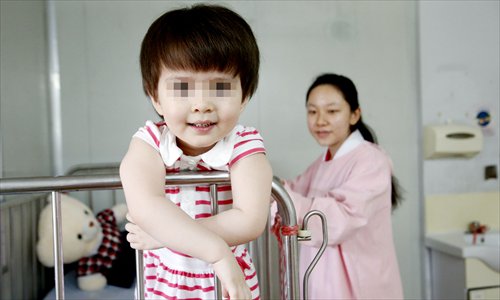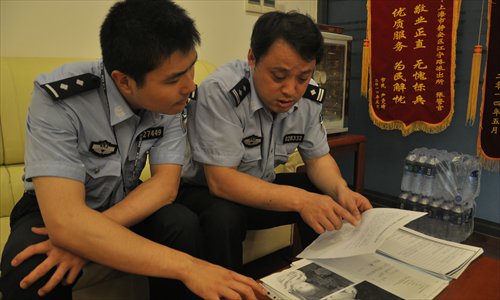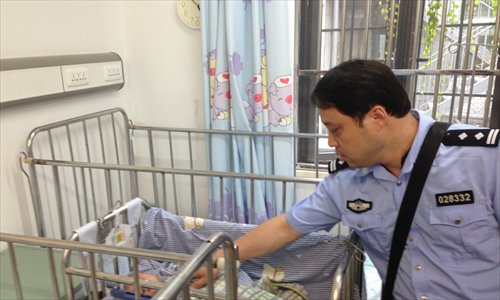The parent tracker
How a Shanghai police officer reunites families and abandoned babies

Alimu, abandoned at the Children's Hospital of Shanghai for over two years, is soon to be reunited with her mother. Photo: Youth Daily-IC
Two weeks ago, a young woman from the Xinjiang Uyghur Autonomous Region came to Shanghai to visit a 2-year-old girl at a city children's hospital. The pretty little girl has a cute round face, big eyes and dark brown hair. Her nickname is Alimu and she has lived in this hospital since the day after she was born in a neighboring public hospital in Putuo district.
Alimu was born alongside a twin sister on January 14, 2012 and the two babies were rushed to the Children's Hospital of Shanghai but her sister died the following day. That same day her mother walked out of the hospital and was not seen - until recently. From that moment little Alimu's home was a small bed with a few dolls in a hospital ward. Some of the nurses looked after her as much as they could - they volunteered to do this.
Sadly Alimu is not the only child who has been abandoned by parents and is living in a hospital in Shanghai. In October 2012, city media published details of six abandoned babies who were living at the Children's Hospital of Shanghai but no one arrived to claim the children.
Legally difficult
These children, like Alimu, are in a difficult legal position. Officially they are not orphans because their parents left personal information with the hospital - though most of their addresses and phone numbers were fake. Because they are not orphans the city government cannot step in and offer them welfare, education and an upbringing in an orphanage. Instead they have to remain in hospitals being cared for by hard-pressed medical staff who look after these children as an unpaid act of charity. There is little hope that their parents will reappear.
Toward the end of 2012, after publicizing the problem but with no results, the hospital called in the local police and asked if they could help find the parents of these children. Over the following 18 months staff at the Jing'an District Public Security Bureau painstakingly tracked down and reunited four of the children with their parents. One was sent to a city orphanage after his father proved untraceable. Little Alimu is the last child of this group and until Monday police had been waiting on the results of the DNA test the young woman undertook.
The police have been looking for the young woman for a long time. "We have been looking forward to the test results," said Zhao Gengyuan, the police officer at the Jiangning Road Police Station who has helped reunite the abandoned babies with their families. On Monday the identity of mother was confirmed. Over the next few days Alimu will be vaccinated and will be given a new birth certificate before she leaves for Xinjiang with her family.
The first of these hospital children to be returned to their parents was a girl named Gao Li. She was born in May 2009, suffering from pneumonia and a congenital heart disease among other health problems. After her parents took her to the hospital they vanished and the hospital became her home even though her health was back to normal after two months of treatment.
Officer Zhao told the Global Times that the hospital had tried to contact the parents many times, "there were lots of phone calls and letters sent to them, but there was no response at all."
In December 2012, Zhao was assigned to look for Gao's family. He went to a village in the suburban Jiading district based on an address Gao's parents had left, and later found her father with the help of locals. The man first denied that little Gao was his daughter.
But Zhao could see the man was answering his questions nervously and was stammering. "Then I showed him Gao's photos, and told him that his cute little girl was now healthy."

Zhao Gengyuan (right), a police officer at the Jiangning Road Police Station, goes through abandoned children files with a colleague. Photo: Huang Lanlan/GT
Eventually persuaded
The man was eventually persuaded to visit the hospital and see the girl and though he kept maintaining she was not his daughter he accepted the fact after a paternity test proved this was the case. Eventually he took the little girl home to look after her.
The second abandoned child reunited with his family was 4-year-old Wang Haojun who had been beaten by his mother's boyfriend and suffered serious head injuries in 2011. The mother vanished after leaving the boy in the hospital but Zhao found her two years later, working in a barbershop in Putuo district. "When I asked her whether she had heard of a boy named Wang Haojun, she froze and then burst into tears," Zhao said.
Another boy, Xu Didi, had been taken to hospital with pneumonia in May 2011 but when he got better none of his family arrived to collect him. It took Zhao more than 10 months persistent searching to track down the boy's grandfather whom he eventually found living in the countryside in Jiangsu Province. The old man said Xu's father had left his hometown years before and had never contacted him. He refused to give any information about the boy's mother.
The old man accepted that the boy was his grandson but was reluctant to agree to look after him. Zhao arrived to see the man along with some colleagues and staff from the hospital who took the grandfather through the steps of applying for a welfare allowance that would enable him to raise the boy himself.
Late in 2013 Zhao brought the grandfather to the hospital ward where little Xu was staying. It was an extraordinary moment, the police officer recalled. "To my complete surprise when he saw the cute little child, he knelt on the ground in gratitude to us."
Nervous and anxious
In Zhao's experience while these reunions were emotional and inspiring events for the adults involved, the children, who had been living in the hospital most of their lives, were very nervous and anxious when they had to meet these "strangers."
"They were reluctant to get close to their families," Zhao said. The little girl, Gao, for some time refused to call her father dad. "These children who have been abandoned have no idea what a dad is," he told the Global Times. "They have been calling the nurses mom or sister."
Zhao has talked to these parents who walked away from their children and said most of them believed that the children would be better cared for and would have a better life in a hospital rather than growing up in a poor or broken home. "They believed they did the right thing for their children."
But Zhao doesn't think this is the case. The 47-year-old police officer and father as well, sees these children without parents being over shy and unable to communicate well. "Moreover, without a hukou (permanent household registration permit), they can't be vaccinated and could be more vulnerable to contracting a serious illness." The children rarely go outside the hospital and spend most of their time in wards.
While the parents are found by the police they usually talk about their own difficult situations and their poverty. "They all say that it's hard for them to make a living and they can't afford the expense of raising a child. Some are single parents who had these babies before they married."
Alimu's mother was an ethnic minority woman who gave birth to the twin girls in Shanghai when she was just 17. In February 2012, she was questioned by police in Hongkou district about a theft. Ironically it was her police mug shot that became an important link when Zhao was searching for her.
Zhao worked hard trying to locate missing parents, beginning by checking the old addresses they had given to the hospital and then talking to other police stations and neighborhood committees.
Zhao said parents had two major doubts about bringing abandoned children back home. The first was whether the children were healthy - the six left at the Children's Hospital of Shanghai had all recovered.
The other problem was the expense of their medical treatment. Over months of treatment in the hospital the children's hospital bills had amounted to a considerable sum which their families would never be able to afford. "Gao's hospital bills came to some 190,000 yuan ($30,628) during her stay there," Zhao said. Her father paid 20,000 yuan to the hospital and wrote an IOU for the remainder.
The hospital has few expectations it will recover all the money. "We do have their IOUs, but we've no idea when or how they will give the money back to us," a hospital staff member surnamed Xie told the Global Times.

Zhao visits abandoned children at the Children's Hospital of Shanghai. Photo: Courtesy of Zhang Xin
Better off
Though Alimu, Gao, Wang and Xu and the others may face many problems after they are reunited with their families, they are better off than the thousands of abandoned babies in this city who will never get to meet their parents.
A survey in 2013 revealed there were 1,289 abandoned babies being treated at Shanghai's hospitals - 144 were left in a hospital waiting for their parents for months or even years. The survey was conducted by the Shanghai Women's Federation and the Shanghai University of Political Science and Law (SHUPL).
"It's hard to know what the future of these 144 kids will be if their families don't appear," said Yao Jianlong, the head of the School of Criminal Justice at SHUPL. Yao worked on the survey and explained that although the children were abandoned they are not regarded as orphans because there is no evidence that the parents have decided to leave the children permanently. "Legally the parents are still the guardians so the children cannot be taken in by orphanages."
No one knows in these cases how long the children might have to stay in the hospitals - just as no one knows exactly where the parents have gone.
After repeated efforts to locate his parents failed, one of the six abandoned children, a 3-year-old boy named Chen Cheng, was sent to an orphanage, the Shanghai Children's Welfare Institute this year. According to a staff member at the institute the little boy has been given a new name and now lives with another 600 children.
Other parents abandon their children in public places. In 2011 Zhao found a sick and deformed baby who had been left wrapped up in clothes on Beijing Road West. There was nothing to identify the child or his family.
Last year, the Jiangning Road Police Station handled more than 30 cases of abandoned babies. These babies left on streets or outside are much more vulnerable to disease and ill health but it is also harder to find the parents.
Criminal offence
It is a criminal offence in China to abandon a child. SHUPL's Yao said parents who abandoned their children could be fined, imprisoned or even have their rights to the child removed. Hospitals like the Children Hospital of Shanghai could prosecute parents who left their children there. But Xie from the Children Hospital of Shanghai said the hospital never prosecuted these people. "None of the parents say they will not be looking after the children - they just disappear."
Since 2011, major Chinese cities like Nanjing, the capital of Jiangsu Province, have followed the example of some Western countries and set up "baby hatches" for abandoned infants.
Already 32 baby hatches have been established throughout China and have reportedly accepted some 1,400 abandoned babies. In Shanghai, there is no specific organization that is dedicated to looking after these children.
Yao would like to see a baby hatch in Shanghai, saying it could save lives. "If a baby has been abandoned the government should step forward and look after it."
Newspaper headline: How a Shanghai police officer reunites families and abandoned babies